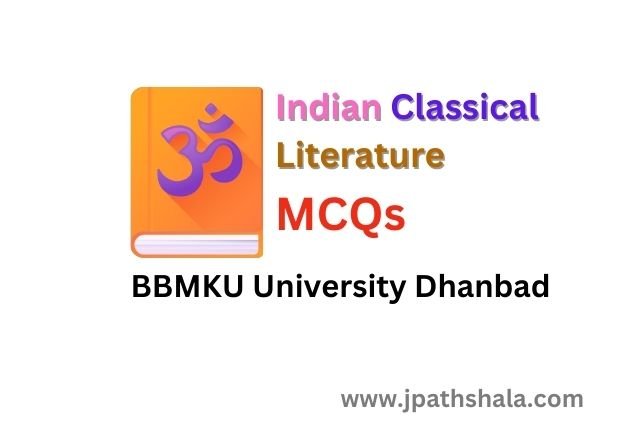Indian Classical Literature is a core paper for the students of BA English Semester 1 like BBMKU University. In this article, 30 MCQ questions have been discussed that are very important for the examination of 1st year under the BBMKU University.
Indian Classical Literature MCQ
1. Who is known as the “Adi Kavi” (First Poet) in Sanskrit literature?
a. Valmiki
b. Vyasa
c. Kalidasa
d. Tulsidas
Show Ans
2. Which epic is attributed to the sage Vyasa?
a. Rigveda
b. Ramayana
c. Bhagavad Gita
d. Mahabharata
Show Ans
3. The “Natya Shastra,” a foundational work on dramaturgy, is attributed to:
a. Tulsidas
b. Bharata Muni
c. Kalidasa
d. Patanjali
Show Ans
4. Kalidasa, a renowned poet, is associated with which classical Indian language?
a. Sanskrit
b. Tamil
c. Telugu
d. Kannada
Show Ans
5. Who wrote the famous Sanskrit play “Shakuntala”?
a. Kalidasa
b. Bhasa
c. Sudraka
d. Harsha
Show Ans
6. “Raghuvamsha” is an epic poem written by:
a. Tulsidas
b. Valmiki
c. Kalidasa
d. Vyasa
Show Ans
7. The “Geet Govind” is a work by the poet:
a. Surdas
b. Kabir
c. Jayadeva
d. Tulsidas
Show Ans
8. The author of “Meghaduta” is:
a. Kalidasa
b. Bhasa
c. Sudraka
d. Harsha
Show Ans
9. In which language did Tulsidas write the epic “Ramcharitmanas”?
a. Sanskrit
b. Hindi
c. Awadhi
d. Maithili
Show Ans
10. The term “Alankara Shastra” refers to the study of:
a. Rhetoric and poetics
b. Grammar
c. Phonetics
d. Metrics
Show Ans
11. The “Thirukkural” is a classic Tamil work attributed to:
a. Thiruvalluvar
b. Kambar
c. Bharathi
d. Manickavacakar
Show Ans
12. Who is often considered the father of modern Hindi literature?
a. Kabir
b. Premchand
c. Tulsidas
d. Surdas
Show Ans
13.”Silappadikaram” and “Manimekalai” are important works in which South Indian classical language?
a. Telugu
b. Kannada
c. Tamil
d. Malayalam
Show Ans
14. Which ancient Sanskrit text discusses the principles of drama and stagecraft?
a. Arthashastra
b. Natya Shastra
c. Kamasutra
d. Manusmriti
Show Ans
15. The “Panchatantra” is a collection of:
a. Fables and moral stories
b. Epic poems
c. Love stories
d. Historical narratives
Show Ans
Indian Classical Literature MCQ
16. The philosophical work “Yoga Sutras” is attributed to:
a. Adi Shankaracharya
b. Patanjali
c. Ramanuja
d. Madhvacharya
Show Ans
17. The language of the classical literature “Periya Puranam” is:
a. Sanskrit
b. Pali
c. Tamil
d. Prakrit
Show Ans
18.”Gitanjali,” a collection of poems that earned Rabindranath Tagore the Nobel Prize in Literature, was originally written in which language?
a. Bengali
b. Hindi
c. English
d. Urdu
Show Ans
19. The Sanskrit play “Mricchakatika” (The Little Clay Cart) is attributed to:
a. Kalidasa
b. Bhasa
c. Sudraka
d. Harsha
Show Ans
20.”Bhakti movement” in India was associated with the composition of devotional literature in languages such as:
a. Sanskrit and Pali
b. Tamil and Kannada
c. Hindi and Marathi
d. All of the above
Show Ans
21. The author of the “Manusmriti” is:
a. Valmiki
b. Vyasa
c. Manu
d. Bhrigu
Show Ans
22. The famous Tamil epic “Silappadikaram” is attributed to:
a. Kambar
b. Thiruvalluvar
c. Ilango Adigal
d. Bharathi
Show Ans
23. The poetry collection “Gitanjali” by Rabindranath Tagore contains how many poems?
a. 50
b. 75
c. 100
d. 150
Show Ans
24. Who is the author of “Anand Math,” a novel that popularized the hymn “Vande Mataram“?
a. Bankim Chandra Chattopadhyay
b. Rabindranath Tagore
c. Sarojini Naidu
d. Kazi Nazrul Islam
Show Ans
a. Bankim Chandra Chattopadhyay
Hide Ans
25. The “Rajatarangini,” a historical chronicle, was written by:
a. Kalhana
b. Bana
c. Harsha
d. Dandin
Show Ans
Also read
26.”Bhagavad Gita” is part of which Indian epic?
a. Ramayana
b. Mahabharata
c. Puranas
d. Upanishads
Show Ans
27. The first Indian classical literature is:
a. Manusmriti
b. The Geeta
c. The Ramayana
d. Rigveda
Show Ans
28. Which language was the first Indian classical literature written in?
a. Sanskrit
b. Pali
c. Tamil
d. Prakrit
Show Ans
29. Who is considered the author of the Rigveda?
a. Vyasa
b. Valmiki
c. Vasishta
d. Rishi Angiras
Show Ans
30. Who is the god most frequently praised in the Rigveda?
a. Vishnu
b. Shiva
c. Agni
d. Indra
Show Ans
Hope you Enjoyed the Lessons
In conclusion, exploring Indian Classical Literature through these multiple-choice questions has offered us a glimpse into the rich tapestry of cultural, philosophical, and artistic expressions embedded in the ancient texts. The diverse array of questions has not only tested our knowledge but has also sparked a curiosity to delve deeper into the vast literary landscape of India. Indian Classical Literature, with its timeless wisdom and profound insights, serves as a beacon that continues to guide and inspire generations. As we navigate the realms of these literary treasures, may our quest for knowledge be fueled by a sincere appreciation for the profound heritage that Indian Classical Literature unfolds.

